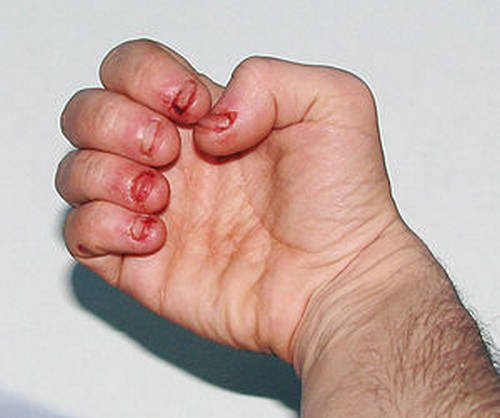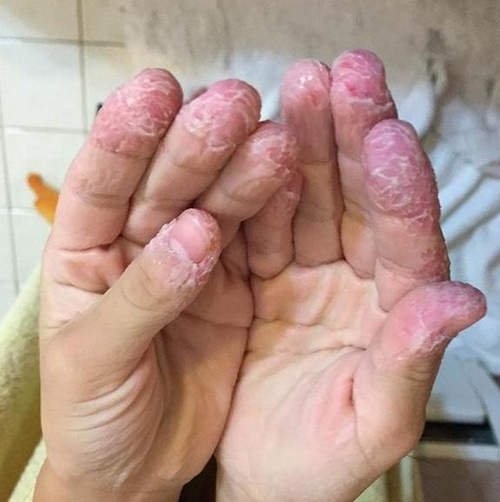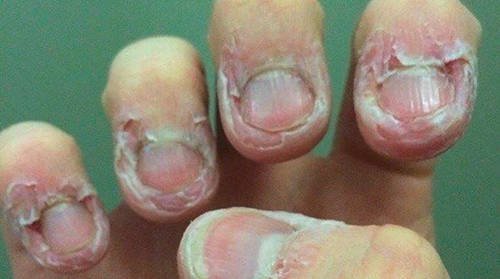Dermatophagia
Have you seen people who are fond of biting their nails? Nail biting is quite common, especially if you are under a great deal of stress. However, some people tend to bite their nails out of a habit. Worst, they result in not only biting their nails but chewing them including the surrounding skin.
For people who have this habit, they are actually suffering from a condition called dermatophagia, which belongs to the obsessive-compulsive disorder. In layman’s term, those who have a morbid habit of biting their nails are called wolf biters.
These people bite their nails even if they are not in a stressful situation. They bite their nails and the skin surrounding it causing severe bleeding and damage. This simply goes to show that what seems to be a habit is actually a disorder.
From a medical standpoint, dermatophagia belongs to the body-focused repetitive behavior. Other habits that actually belong to this type of disorder are the habit of pulling the hair, picking the skin, tongue chewing, chronic biting of the lips, and hair eating. (1, 2, 3, 4)

Image 1: Nails are extremely short and the surrounding skin has reddish discoloration with dried blood stains all around – a classic manifestation of dermatophagia.
Picture Source: upload.wikimedia.org

Photo 2: The skin surrounding the nails are distorted secondary to nail biting and chewing of the skin.
Image Source: i.imgur.com
What is the cause?
Dermatophagia is an excessive compulsive disorder, a mental condition wherein a person has the habit of doing things repetitively to the point of causing more harm than good.
There is some research suggesting that dermatophagia has something to do with the genetic makeup of the person. Other possible causes include extreme stress, traumatic childhood, and just plainly out of boredom. (3, 4)
Who are at risk for dermatophagia?
According to statistics, dermatophagia is more common in women than men. Environment, exposure to stress, and temperament can all contribute to the onset of dermatophagia.
Clinical Manifestations

Picture 3: A severely distorted fingernails and skin caused by excessive biting of the nails.
Photo Source: img-s3.onedio.com
Dermatophagia symptoms are pronounced that you can easily identify someone who has it. Signs and symptoms include the following:
- Frequent biting of the nails and the surrounding skin.
- The skin surrounding the nails are red and sometimes bleed.
- You will notice discoloration, calluses, and scarring around the fingernails.
- The person is uneasy and uncomfortable when he/she can’t bite her nails. (4, 5, 6)
What are the possible complications?
Dermatophagia, although may sound like a simple condition can actually affect a person’s physical and mental health. Some of the possible complications include:
- Risk for infection – An intact skin is the body’s first line of defense. Frequent biting of the nails and the skin surrounding it leads to open wound in which bacteria can enter through the broken skin. Signs of infection include pain, tenderness, swelling around the nails, fever with or without chills, and purulent discharge, especially when the infection is in the advanced stage.
- Social withdrawal – There are instances when a person is actually ashamed of the nail-biting behavior, especially when other people start to notice it. Chances are they tend to isolate themselves from the public. Eventually, their self-esteem and self-confidence will be affected. There is also a possibility of depression. (6, 7, 8)
Diagnosis
Diagnosing dermatophagia is all about differentiating a simple habit from a disease condition. Is dermatophagia a mental disorder? The truth is that body-focused repetitive behavior like dermatophagia is included in the Diagnostic and Statistical Manual of Mental Disorder under the other forms of obsessive-compulsive disorder.
There should be a significant damage or distress to the patient before it can be classified as DSM-V. (7, 9)
Dermatophagia Treatment
There are various treatment modalities used for dermatophagia. They are divided into the following categories:
Therapy
- Behavior modification therapy – There are various ways psychologist used to discourage nail biting behavior such as polishing the nail with a foul-smelling substance. Some use artificial nails, something made of gel or acrylic which will discourage the patient from biting the nails.
- Cognitive behavioral therapy – The patient’s root cause of dermatophagia is addressed, especially if the behavior is brought by stress and other emotional triggers. The psychologist, patient, and immediate family work hand in hand to address emotional triggers. It may take some time but is actually effective, especially if the triggering factors are identified and addressed. (1, 7, 9, 10)
Dermatophagia medication
Aside from the behavior and cognitive approach, there are medications that can help address the nail-biting behavior. Depending on the assessment of the patient, the doctor might require the use of antidepressants.
However, antidepressants should be used carefully and should only be given under the supervision of a mental health professional. As you know, antidepressants have an addicting effect. It is prone to misuse and abuse.
Medications prescribed are selective serotonin reuptake inhibitors such as paroxetine, sertraline, escitalopram, and fluoxetine. A dermatophagia cream can be given to the patient too in order to improve the condition and integrity of the skin. There are also instances when an antibacterial cream is prescribed to treat infection particularly on the skin that surrounds the nails. If the skin surrounding the nails are open, it should be cleaned regularly and covered with a sterile bandage to prevent infection. (3, 9, 10)
Natural remedies for dermatophagia
The symptoms of dermatophagia can be gradually reduced with the help of these natural remedies. They are acupuncture, massage, engaging in relaxing activities that will help lessen stress such as exercise, joining sports, and even simple breathing exercises. Nail biting can also be reduced to a great extent if the patient chews gums.
If you or someone you know might have dermatophagia, then the best thing to do is to consult a mental health professional. Just because you are consulting a mental health professional does not necessarily mean that you are crazy. This notion is wrong. Seeing a mental health expert simply means that there is a certain aspect of your mental and psychological health that you want to address. (3, 7, 10)
References:
- https://en.wikipedia.org/wiki/Dermatophagia
- https://www.epainassist.com/mental-health/what-causes-dermatophagia-and-how-is-it-treated
- https://www.healthline.com/health/dermatophagia
- https://www.doctorshealthpress.com/brain-function-articles/dermatophagia/
- https://ehealthwall.com/dermatophagia-treatment-pictures-causes-symptoms/
- https://putthatcheeseburgerdown.com/2018/01/06/mental-health-5-signs-that-you-suffer-from-dermatophagia/
- https://onedio.co/content/the-scary-disorder-that-makes-you-eat-yourself-dermatophagia-12663
- https://www.bfrb.org/learn-about-bfrbs/treatment/self-help/170-living-with-dermatillomania-and-dermatophagia
- http://www.mylifeinlimbo.com/self-care/dermatophagia-tips/
- https://www.skinpick.com/node/3713